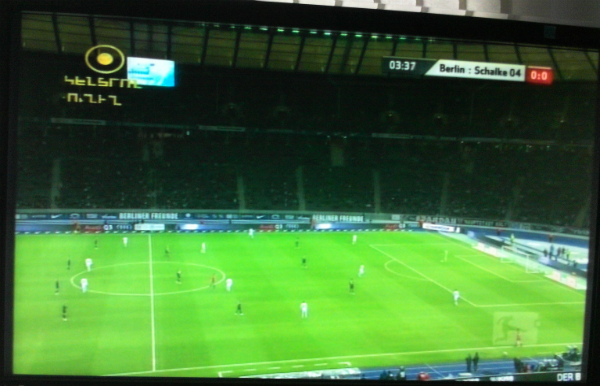Football has successfully seized Armenia’s airwaves. Particularly on the weekends, comfortably seated on the sofa, you can watch football for the entire day, flipping from one channel to another. H1, H2, Channel 12, Kentron and Shant TV allocate ample broadcasting slots for this game for the masses. There’s a real football “boom” on Armenian airwaves. It’s clear as day that to broadcast so many football matches it’s necessary to have just as many good commentators, who, at the very least, have to not ruin the football festivities. Do we have such specialists? We can say confidently, no. With some exception, Armenia doesn’t have such commentators, who you want to hear and who make even boring matches entertaining.
It’s true, things haven’t gotten so bad in Armenia that broadcasters come on air inebriated — as happened last January with Russian sports commentator Dmitry Savin on NDV+ TV, who though not sacked after covering the game between Milan and Cesena, was “dropped from the schedule”. But when you watch a long-awaited football tournament and the commentator, with his many linguistic stumbles, and boring and monotonous commentary, ruins your mood, it’s already unforgivable. It’s noteworthy that the commentator begins to make mistakes particularly when there’s a tense moment on the field.
One day, after hearing the usual absurdity, I decided to jot down the “masterpieces” of his remarks:
“What type of goal-scorer he becomes from the direct corner [sic],” exclaims the commentator of the match between Manchester United and Napoli. Or, “This was a more dangerous moment than it became time for a goal [sic],” he says. Of course, it’s hard to understand what our Makharadze of today wanted to say (by the way, Kote Makharadze was an amazing football commentator during the Soviet period). “Balotelli is winning the ball,” says the broadcaster in Armenian at another match, not realizing that he is literally translating from a Russian sentence in his head.
Also in need of an edit is the phrase that was uttered during the Zenit-Shakhtar match: “The game is moving figuratively successfully [sic]” — when what he actually meant was “relatively” and not “figuratively” (the two words sound similar in Armenian). Or, our most well-known football commentator says “the ball was neutralized” when it would be more accurate to say “the blow [or attack] was neutralized”.
During an Italian Serie A match, the commentator, trying to leave the impression of of one who’s informed, says: “Of course, we know this team with its superstar, well-known football player…” and after an unexpected and inappropriate silence, adds, “Would you believe it? I forgot his name”. If you had forgotten it, then don’t say it — who asked you to mention it? Or, the same commentator introduces a player who’s come to replace another player, “He will try to change the way the game is going during the match”. It’s true, here at least he apologized to viewers for his poor choice of phrase. But do many follow his example?
Of course, it should be considered that football commentators are on air live and it’s impossible not to make mistakes. But the stumbles should at least be within a reasonable amount, and not 40–50% of what is said. I don’t know, if you like, you can find a school where they teach the art of football commentary… though I’m not sure.
For this profession, it’s not enough to possess perfect oral skills or to speak clearly and simply. Moreover, even having a friend or family member working in television won’t save you. To be successful in this field, you have to understand all the subtleties of football, to know the history and be up-to-date on news, and to be able to convey this to viewers. Yes, being a football commentator is not as easy as it seems, particularly when every tense period of the game has to be addressed live with no chance of editing — well, you can’t apologize every minute, can you?
It remains for Armenian commentators to always be up on their game, to retrieve from the archives and listen to such great commentators as were Nikolai Ozerov, George Sarkisyants, Vladimir Maslachenko, or our very own Danielyan.
Otherwise, we will be forced to follow the examples of Hovhannes Zanazanyan or Armen Dzhigarkhanyan, who turn off the sound when watching television. The latter, an honored actor, explained his reason for doing so as such: “I don’t need football commentary, which, by the way, I realized perchance. When I was in the US, during the 1994 World Cup, I turned on the TV and didn’t understand a word of what the American commentator was saying. Then I realized that you can simply turn off the volume, after which I was joyful. Now I can’t even imagine how someone can describe to me, for example, that Petrov passed the ball to Sidorov, and Sidorov was smoking a narghile [hookah] yesterday. I don’t need it.”
Perhaps we too should turn off the volume the TV when watching football. We’re just somewhat unaccustomed to follow developments on the turf in silence. It’s probably better to go to the stadium.
Tigran Hovhannisyan, senior player with the football team of Armenian journalists






